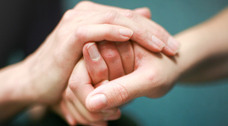Le Douglas débute une initiative de soutien par les pairs
31-01-2007

Imaginez que vous vivez avec un problème de santé mentale. Venir à bout de problèmes relationnels, de difficultés à se trouver un emploi et à réintégrer la société peut paraître un défi insurmontable, un défi souvent incompris par les autres. Toutefois, l’espoir est là pour certains, grâce à la nouvelle initiative de soutien par les pairs introduite à l'Hôpital Douglas
Mise en place dans le cadre de la semaine d’Entraide par les pairs, cette initiative culminera avec le lancement d'un nouveau projet pilote qui consistera en l'embauche d'un pair aidant. L’approche du soutien par les pairs permet à des personnes ayant été affectées par la maladie mentale d’être formées afin d’aider d’autres personnes atteintes de trouble de santé mentale en leur offrant un soutien émotionnel indispensable.
«Le concept de pair aidant n'est pas nouveau. Les Alcooliques Anonymes l'utilisent depuis plus de 60 ans, affirme Nicole Lahaie, coordonnatrice d’un programme de réadaptation au Douglas. Ces programmes opèrent selon le principe que les personnes qui ont vécu un problème et réussi à le surmonter sont très efficaces pour aider les autres à faire la même chose. C’est une façon très innovatrice de considérer les soins de santé mentale.»
«Cette approche a pris naissance aux États-Unis et été créée pour aider les gens atteints de graves problèmes de santé mentale à gérer leur propre maladie, à contribuer à la vie en société et à vivre des vies productives en dépit d’incapacités ou de symptômes permanents, ajoute Myra Piat, Ph.D., chercheur au Douglas. Une grande emphase est mise sur les droits des individus à faire des choix significatifs et encourage la société à soutenir leurs objectifs. Cette approche met également de l’avant le fait qu’avec les améliorations des médicaments actuels et de meilleures méthodes de traitement, le rétablissement est possible, fait étayé par des études scientifiques.»
Dans le cadre de la semaine d’Entraide par les pairs, le Douglas offrira des ateliers présentés par Roy Muise, un activiste et un spécialiste de l’entraide par les pairs travaillant pour le Consumer Initiative Centre, à Dartmouth en Nouvelle-Écosse. Diagnostiqué d’une dépression majeure il y a environ 25 ans, Roy est aujourd’hui un spécialiste certifié par ses pairs et s’aide lui–même en aidant d’autres à faire face à leurs défis. Le jeudi 1er février 2007, il présentera une conférence dans laquelle il discutera du WRAP (Wellness Recovery Action Plan), un outil qui promeut la croissance personnelle, le rétablissement et le bien-être. Le WRAP peut être extrêmement efficace pour aider les gens à trouver leur propre voie de rétablissement.
Suite à cette semaine spéciale, un pair aidant sera engagé par le biais d’un projet pilote et offrira des session d’éducation et de soutien du WRAP au Centre Wellington du Douglas. Le Centre Wellington offre également de nombreuses activités et programmes qui incluent des services d’éducation socioprofessionnelle et d’intégration sociale, de même que des services d’études adaptés au niveau secondaire et des services de soutien et de placement à l’emploi.
« Nous croyons qu’il est important que notre système de santé mentale développe des services orientés vers le rétablissement afin d’accompagner et soutenir les personnes dans leur cheminement vers le rétablissement », conclut Nicole Lahaie.


